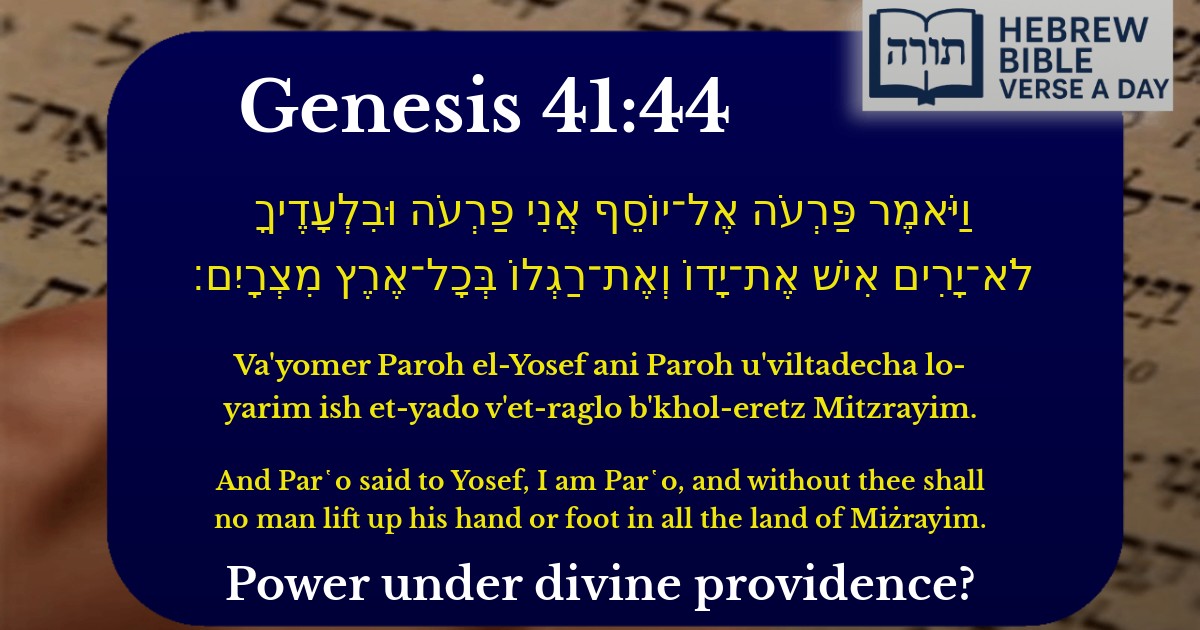Join Our Newsletter To Be Informed When New Videos Are Posted
Join the thousands of fellow Studends who rely on our videos to learn how to read the bible in Hebrew for free!
Hebrew Text
וַיֹּאמֶר פַּרְעֹה אֶל־יוֹסֵף אֲנִי פַרְעֹה וּבִלְעָדֶיךָ לֹא־יָרִים אִישׁ אֶת־יָדוֹ וְאֶת־רַגְלוֹ בְּכָל־אֶרֶץ מִצְרָיִם׃
English Translation
And Par῾o said to Yosef, I am Par῾o, and without thee shall no man lift up his hand or foot in all the land of Miżrayim.
Transliteration
Va'yomer Paroh el-Yosef ani Paroh u'viltadecha lo-yarim ish et-yado v'et-raglo b'khol-eretz Mitzrayim.
Hebrew Leining Text
וַיֹּ֧אמֶר פַּרְעֹ֛ה אֶל־יוֹסֵ֖ף אֲנִ֣י פַרְעֹ֑ה וּבִלְעָדֶ֗יךָ לֹֽא־יָרִ֨ים אִ֧ישׁ אֶת־יָד֛וֹ וְאֶת־רַגְל֖וֹ בְּכׇל־אֶ֥רֶץ מִצְרָֽיִם׃
וַיֹּ֧אמֶר פַּרְעֹ֛ה אֶל־יוֹסֵ֖ף אֲנִ֣י פַרְעֹ֑ה וּבִלְעָדֶ֗יךָ לֹֽא־יָרִ֨ים אִ֧ישׁ אֶת־יָד֛וֹ וְאֶת־רַגְל֖וֹ בְּכׇל־אֶ֥רֶץ מִצְרָֽיִם׃
🎵 Listen to leining
Parasha Commentary
📚 Talmud Citations
This verse is not quoted in the Talmud.


Pharaoh's Declaration of Authority and Yosef's Role
The verse (Bereishit 41:44) records Pharaoh's proclamation to Yosef: "I am Pharaoh, and without thee shall no man lift up his hand or foot in all the land of Mitzrayim." This statement reflects Pharaoh's absolute delegation of power to Yosef, elevating him to the highest position under the throne.
Rashi's Explanation
Rashi comments that Pharaoh emphasizes "I am Pharaoh" to assert that despite Yosef's new authority, Pharaoh remains the supreme ruler. The phrase "without thee shall no man lift up his hand or foot" means no one in Egypt could take any significant action without Yosef's permission. Rashi interprets "hand or foot" as a metaphor for any movement or initiative—highlighting Yosef's total administrative control.
Rambam's Perspective on Leadership
Rambam (Hilchot Melachim 2:6) discusses the delegation of authority by a king to a trusted viceroy. Pharaoh's statement aligns with this model, where Yosef becomes the Mishneh LaMelech (second to the king), a position granting him near-absolute power while still subordinate to Pharaoh. This mirrors the later role of the Sar HaMashkim (chief butler) in the Persian court (Esther 1:8).
Midrashic Insights
Symbolism of "Hand or Foot"
The Talmud (Chullin 91a) interprets "lifting a hand or foot" as a reference to military and economic control—no army could mobilize (hand) nor trade could proceed (foot) without Yosef's command. This underscores his dual role as vizier and strategist, ensuring Egypt's survival during the famine.